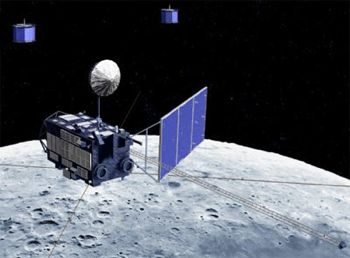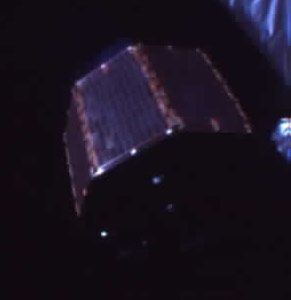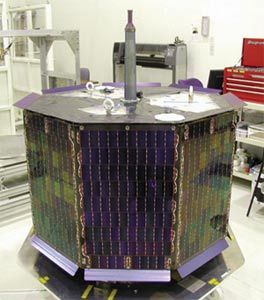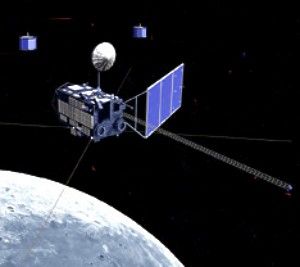Kaguya (original) (raw)

Home - Search - Browse - Alphabetic Index: 0- 1- 2- 3- 4- 5- 6- 7- 8- 9
A- B- C- D- E- F- G- H- I- J- K- L- M- N- O- P- Q- R- S- T- U- V- W- X- Y- Z
Kaguya
Japanese lunar orbiter. Launched 2007.09.14.
AKA: Okina;Ouna;Selene. Status: Operational 2007. First Launch: 2007-09-14. Last Launch: 2007-09-14. Number: 3 . Gross mass: 2,900 kg (6,300 lb). Height: 2.10 m (6.80 ft). Diameter: 2.10 m (6.80 ft).
Objective of the Japan Aerospace Exploration Agency's Kaguya mission (dubbed Selene prior to launch) was to collect lunar data that would contribute to understanding the Moon's origin and evolution. The spacecraft consisted of the main lunar orbiter and two subsatellites, released in lunar orbit to provide relay services and assist in measuring the moon's gravitational field. Using the latest technology, Kaguya broadcast back to earth lunar data and images of immensely greater accuracy and detail than any previous lunar mission.
The satellite was three-axis stabilized with sufficient propellant aboard for a one-year mission in a circular lunar orbit at 100 km altitude and 90 degrees installation. The two subsatellites each had a mass of 50 kg, were spin stabilized, 1.0 m x 1.0 m x 0.65 m in dimension, and had solar cells providing 70 W of power. The Relay Satellite was released by Kaguya into an elliptical lunar orbit of 100km x 2400km, inclination 90 degrees. The VRAD Satellite was released into an elliptical lunar orbit of 100km x 800km, inclination 90 degrees .
The primary instruments carried by Kaguya were:
- X-ray Spectrometer (XRS): The surface elemental composition (Al, Si, Mg, Fe, etc.) was determined through X-ray fluorescence spectrometry by irradiation of solar X-rays.
- Gamma Ray Spectrometer (GRS): The abundance of key elements (U, Th, K, H, etc.) was determined by measuring energy spectra of gamma-rays from the lunar surface with high energy resolution.
- Multi band Imager (MI): The mineral distribution on the lunar surface was obtained by taking visible and near-infrared images of the Moon's surface in nine wavelength bands.
- Spectral Profiler (SP): The mineral composition of the Moon's surface was obtained by measuring the continuous visible and near infrared spectrum.
- Terrain Camera (TC): High-resolution geographical features were imaged by the stereo cameras.
- Lunar Radar Sounder (LRS): The subsurface stratification and tectonic features in the shallow part of the lunar crust (a few km) studied by high-power RF pulses.
- Laser Altimeter (LALT): To construct an accurate lunar topography model, the altitude was precisely measured using high-power laser pulses.
- Environment Lunar Magnetometer (LMAG): The magnetization structure of the Moon was acquired by measuring the lunar and the surrounding magnetic field.
- Charged Particle Spectrometer (CPS): Alpha rays from the Moon's surface and the abundance of cosmic ray particles were measured.
- Plasma energy Angle and Composition Experiment (PACE): The three dimensional distribution of the low-energy electrons and mass-discriminated low-energy ions around the Moon were measured.
- Radio science (RS): The Moon's ionosphere was detected by measuring the small deviation of the phase of RF signals from the VRAD satellite.
- Upper-atmosphere and Plasma Imager (UPI): Images of the magnetosphere and the ionosphere around the Earth were taken from the Moon to study the behavior of the plasma.
- Gravitational field distribution: Four way Doppler measurements by the Relay satellite and Main Orbiter transponder (RSAT): The local gravity field of the far-side of the Moon was observed by measuring the disturbance of the orbit of the Main Orbiter using Doppler measurement.
- Differential VLBI Radio Source (VRAD): The accurate gravity field data of the Moon was obtained by measuring the orbits of Relay and VRAD satellites using differential Very Long Baseline Interferometer observation of S and X band radio waves
- High Definition Television (HDTV): Took pictures and movies of the Earth and Moon with high-definition television cameras.
Electric System: 3.50 kWh.
NASA NSSDC Master Catalog Description
Kaguya (formerly SELENE, for SELenological and ENgineering Explorer), is a Japanese Space Agency (JAXA) lunar orbiter mission. The primary objective of the mission is a global survey of the Moon, obtaining data on elemental abundance, mineralogical composition, topography, geology, gravity, and the lunar and solar-terrestrial plasma environments and to develop critical technologies for future lunar exploration, such as lunar polar orbit injection, three-axis attitude stabilization, and thermal control. The mission consists of three satellites, an orbiter containing most of the scientific equipment, a VLBI (Very Long Baseline Interferometry) Radio (VRAD) satellite, and a relay satellite designed to receive a doppler ranging signal from the orbiter when it is around the far side out of direct contact wth the Earth and transmit the signal to Earth to estimate the far-side gravitational field.
Spacecraft and Subsystems
The orbiter main bus is box-shaped, roughly 2.1 x 2.1 x 4.8 m, divided into a 2.8 m long upper, or mission module which contains most of the scientific instruments and a 1.2 m long lower, or propulsion module. A solar array wing is mounted on one side of the spacecraft. A 1.3 meter high-gain antenna is mounted on one side 90 degrees from the solar panel. A 12 m magnetometer boom juts out of the top of the spacecraft and four 15 m radar sounder antennas protrude from the top and bottom corners of the mission module. The total launch mass of the spacecraft, including 795 kg of propellant and the two satellites, is 2885 kg.
Power is supplied by the solar array, consisting of 22 square meters of GaAs/Ge cells which can generate up to 3486 W and charges four NiH2 batteries of 50 V, 35 Ah capacity. Communications are via S- and X-band through the high-gain antenna with a data rate up to 10 Mbps downlink to a 60 m ground dish in X-band, and 40 or 2 kbps S-band downlink. Four S-band omnidirectional antennas are used for command uplink at 1 kbps. Onboard data recording capacity is 10 Gbytes. Thermal control is achieved by radiators, louvers, and heaters.
A 500 N bipropellant (NTO/N2H4) main engine is mounted in the propulsion module. Orbital maintenance and yaw-pitch attitude are controlled by twelve bipropellant 20 N thrusters. Roll attitude is controlled by eight monopropellant 1 N thrusters. The spacecraft is three-axis stabilized with attitude control provided by four Sun sensors, two IMUs (Inertial Measurement Units), two star trackers, four 20 Nms reaction wheels, and the thrusters. The mission module carries 13 instruments for use in science investigations: a multi-band imager, terrain camera, high definition TV camera, spectral profiler, x-ray spectrometer, gamma-ray spectrometer, radar sounder, laser altimeter, magnetometer, plasma imager, charged particle spectrometer, plasma analyzer, and radio science equipment.
VRAD Subsatellite "Ouna"
The VRAD subsatellite, Ouna, is an octagonal cylinder 0.99 x 0.99 x 0.65 m in size with a mass of 53 kg. A dipole antenna protrudes from the top center of the subsatellite. The spacecraft is spin-stabilized at 10 rpm and has no propulsion units. Power is provided by a 70 W Si solar cell array covering the sides of the satellite which charges a 13 AH, 26 V NiMH battery. It holds one X-band and three S-band radio sources. The satellite in conjunction with the relay satellite will enable differential VLBI observations from the ground. The spacecraft will start in a 100 x 800 km polar orbit and is expected to survive in orbit for over one year. The VRAD and Relay satellites are mounted on top of the mission module before release.
Relay Subsatellite "Okina"
The relay subsatellite is similar to the Ouna VRAD satellite, an octagonal cylinder 0.99 x 0.99 x 0.65 m in size with a mass of 53 kg. A dipole antenna protrudes from the top center of the subsatellite and four small S-band patch antennas are mounted on the spacecraft, two on the top deck and two on the bottom. The spacecraft is spin-stabilized at 10 rpm and has no propulsion units. Power is provided by a 70 W Si solar cell array covering the sides of the satellite which charges a 13 AH, 26 V NiMH battery. The relay subsatellite contains one X-band and three S-band VLBI radio sources and a transponder and will relay the 4-way Doppler ranging signal between a ground station and the orbiter for the far side gravity field investigation from a 100 x 2400 km orbit. Okina impacted the Moon on 12 February 2009.
Mission Profile
Kaguya (SELENE) launched 01:31:01 UT (10:31:01 a.m. Japan Standard Time) on 14 September 2007 on an H-IIA rocket from Tanegashima Space Center. Separation of the spacecraft from the launch vehicle occurred 45 minutes 34 seconds after launch. Kaguya deployed its solar panels and high-gain antenna and completed two orbital maneuvers, the last on 17 September to put it into a 924 x 232,731 km Earth orbit with a period of 4 days, 23 hours, 33 minutes. After three more correction manuevers, a lunar transfer trajectory injection burn was conducted. Kaguya carried out its first lunar orbit injection at 21:20 UT on 3 October (6:20 a.m. October 4 JST) and entered a 101 x 11741 km lunar orbit with a period of 16 hours, 42 minutes. The spacecraft made 6 orbit-transfer maneuvers to lower the orbit to a 118 minute, 80 x 128 km polar science orbit by 19 October. During the transition to lower orbit, the relay satellite Okina was released into a 100 km x 2400 km polar orbit on 9 October at 00:36 UT and the VRAD satellite Ouna was released into a 100 x 800 km orbit at 04:28 UT on 12 October.
Normal operations from orbit for the Kaguya spacecraft started on 20 October, the 12 meter magnetometer mast, two 15 meter Radar Sounder dipole antennas, and the telescope gimbal were deployed between 28 and 31 October. Checkout of the subsatellites was completed by 5 November, check out of other instruments continued until the beginning of December. The 10 month nominal science mission began on 21 December 2007. The main orbiter maintained the near circular orbit for 10 months of science operations, using correction burns roughly every two months to maintain the orbit within 30 km of the 100 km nominal orbit. The nominal mission was completed at the end of October, 2008, with coverage of over 95% of the surface. The 100 km orbital observations were extended for 3 months. The altitude was then lowered to a 50 ( 20) km orbit, operations from this orbit started on 1 February 2009. On 16 April the perilune altitude was reduced to 10 - 30 km.
Kaguya ended its mission as planned, impacting the Moon on 10 June 2009 at 18:25 UT (3:25 a.m. June 11 Japan Standard Time) near 80.4 degrees east longitude, 65.5 degrees south latitude on the Earth-facing side of the Moon. The area was in darkness at the time of the impact, allowing observation of the impact flash from Earth.
Kaguya is named for Kaguya-hime (Princess Kaguya), a visitor to Earth from the Moon in a 10th century Japanese folk tale "Taketori Monogatari" (The Tale of the Bamboo Cutter). The relay satellites, "Okina" and "Ouna" are named after the old man and woman who find and adopt Kaguya-hime.
Family: Lunar Orbiters, Moon. Country: Japan. Launch Vehicles: H-II, H-IIA 2022. Launch Sites: Tanegashima, Tanegashima Y. Agency: JAXA. Bibliography: 2, 6613, 12709.
Photo Gallery
 |
KaguyaCredit: Manufacturer Image |
|---|
 |
OunaCredit: Manufacturer Image |
|---|
 |
OkinaCredit: Manufacturer Image |
|---|
2007 September 14 - . 01:31 GMT - . Launch Site: Tanegashima. Launch Complex: Tanegashima Y. LV Family: H-2. Launch Vehicle: H-IIA 2022.
- Kaguya - . Payload: Selene. Mass: 3,000 kg (6,600 lb). Nation: Japan. Agency: Mitsubishi. Class: Moon. Type: Lunar probe. Spacecraft: Kaguya. Decay Date: 2009-06-10 . USAF Sat Cat: 32054 . COSPAR: 2007-039A.
Another of a series of new lunar probes to be launched in the next few years by China, India, Japan, USA, and Europe. Selene was dubbed Kaguya, a Japanese moon goddess, after launch. It included an HDTV camera. In lunar orbit two subsatellites would be released to provide continuous communications as well as better characterize the moon's gravity field. By 30 September Kaguya was in a 2243 km x 378,132 km lunar transfer orbit. On 3 October at 21:00 GMT it entered its initial 101 km x 11741 km x 95 deg lunar orbit. It then began maneuvers to enter its operational 100 km circular orbit, releasing the subsatellites on 9 and 12 October. - Okina - . Payload: Selene. Mass: 45 kg (99 lb). Nation: Japan. Agency: Mitsubishi. Class: Moon. Type: Lunar probe. Spacecraft: Kaguya. Decay Date: 2009-02-12 . USAF Sat Cat: 32055 . COSPAR: 2007-039B. The Okina relay satellite was released from Kaguya into a 115 km x 2,399 km lunar orbit at 00:36 GMT on 9 October 2007..
- Ouna - . Payload: Selene. Mass: 45 kg (99 lb). Nation: Japan. Agency: Mitsubishi. Class: Moon. Type: Lunar probe. Spacecraft: Kaguya. USAF Sat Cat: 32056 . COSPAR: 2007-039C. The Ouna (VRAD) subsatellite was released from Kaguya into a 127 km x 795 km lunar orbit at 04:28 GMT on 12 October 2007..
Home - Search - Browse - Alphabetic Index: 0- 1- 2- 3- 4- 5- 6- 7- 8- 9
A- B- C- D- E- F- G- H- I- J- K- L- M- N- O- P- Q- R- S- T- U- V- W- X- Y- Z
© 1997-2019 Mark Wade - Contact
© / Conditions for Use
